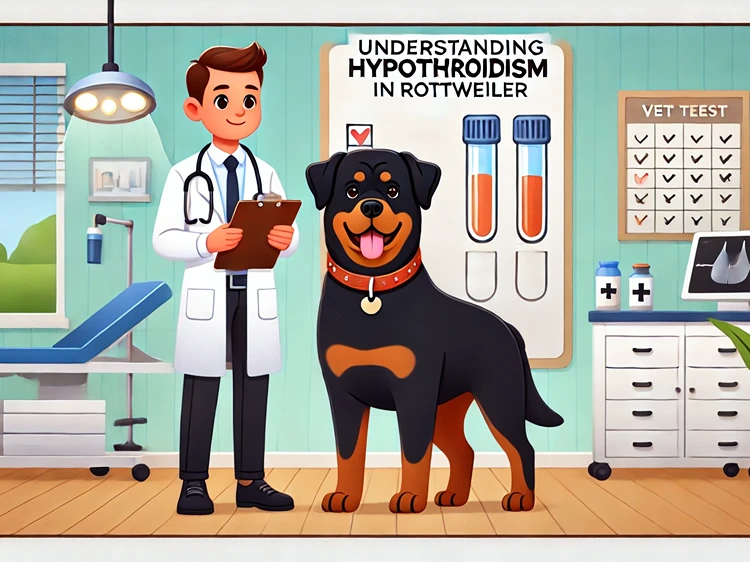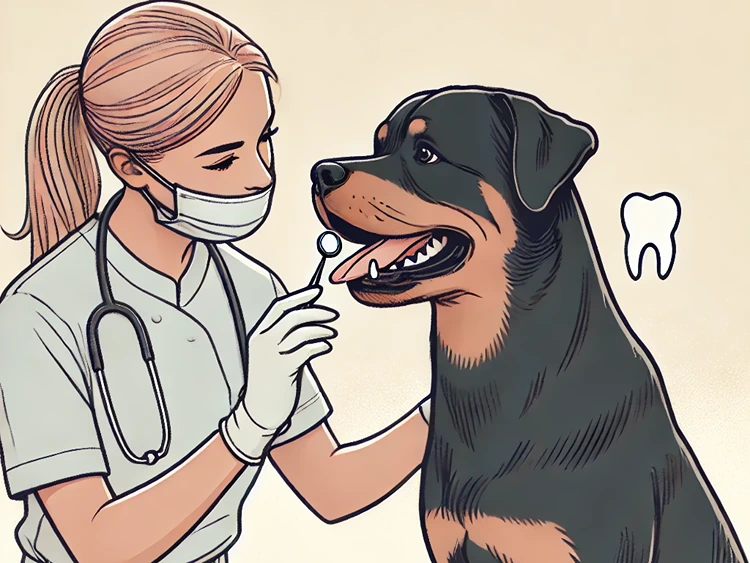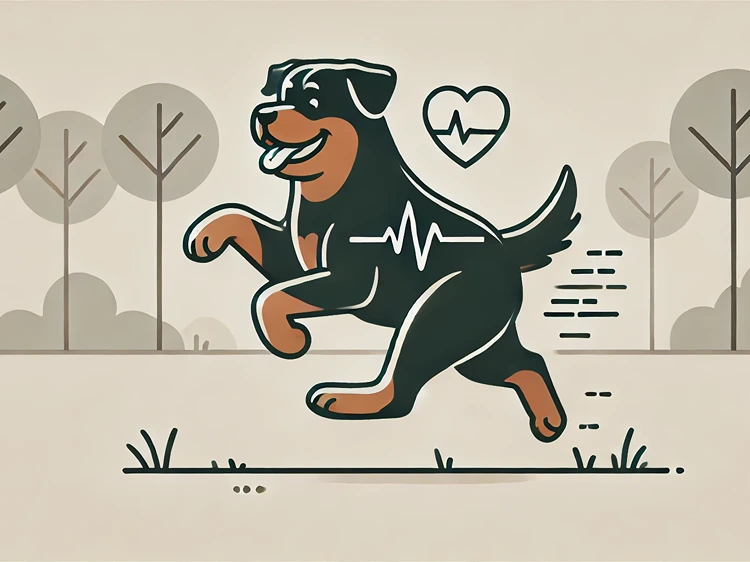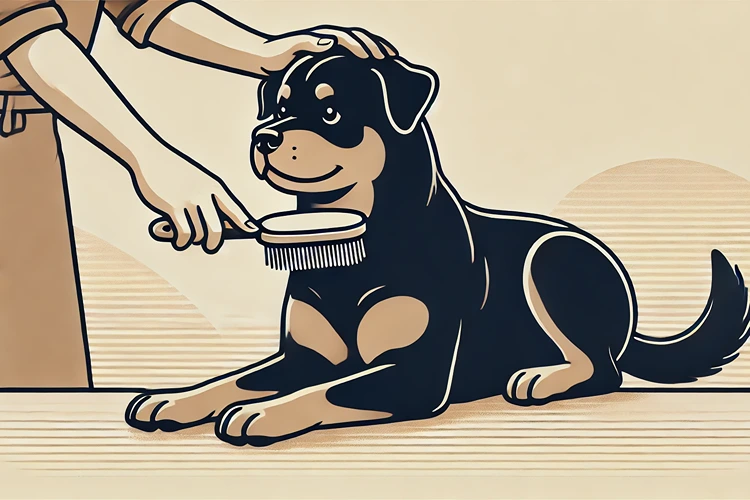Hypothyroidism is a common endocrine disorder in dogs, particularly in breeds like Rottweilers. It can significantly impact your Rottweiler’s quality of life if left untreated. Understanding the symptoms and treatment options for hypothyroidism in Rottweilers is crucial for maintaining your dog’s health and well-being. This article will explore what hypothyroidism is, how it affects Rottweilers, and what you can do to manage this condition effectively.
What Is Hypothyroidism in Rottweilers?
Hypothyroidism occurs when the thyroid gland, located in the neck, does not produce enough thyroid hormones. These hormones are essential for regulating your Rottweiler’s metabolism, which affects almost every organ in the body. When the thyroid is underactive, it can lead to a variety of health issues, from weight gain to skin problems.
In Rottweilers, hypothyroidism is typically caused by autoimmune thyroiditis, where the body’s immune system attacks the thyroid gland. This condition leads to a gradual decline in thyroid function over time. Hypothyroidism can also result from other factors such as congenital defects or exposure to certain medications.
How Does Hypothyroidism Affect Rottweilers?
The thyroid gland plays a crucial role in regulating many bodily functions, including metabolism, heart rate, and temperature. When thyroid hormone levels are low, it can disrupt these processes, leading to a range of symptoms that can be challenging to diagnose. In Rottweilers, hypothyroidism can cause changes in behavior, appearance, and overall health.
For example, a Rottweiler with hypothyroidism may become lethargic, gain weight despite a normal diet, or develop skin issues like dryness and hair loss. Understanding these effects is vital for identifying the condition early and seeking appropriate treatment.
Recognizing the Symptoms of Hypothyroidism in Rottweilers
Identifying the signs of hypothyroidism in your Rottweiler can be challenging, as the symptoms are often subtle and can develop gradually. However, early detection is key to managing the condition effectively. Here are some common symptoms to watch for:
1. Weight Gain
One of the most noticeable signs of hypothyroidism in Rottweilers is unexplained weight gain. Despite maintaining a regular diet and exercise routine, a dog with hypothyroidism may gain weight due to a slowed metabolism. If your Rottweiler is putting on pounds without any obvious cause, it may be time to consult your vet.
2. Lethargy and Fatigue
Rottweilers are known for their energy and enthusiasm, but hypothyroidism can sap their vitality. A dog with this condition may appear unusually tired, sleep more than usual, or show little interest in activities they once enjoyed. This lethargy is often one of the first signs that something is wrong.
3. Skin and Coat Changes
Hypothyroidism can cause a range of skin and coat issues in Rottweilers. You may notice your dog’s coat becoming dull, dry, or thinning in patches. Skin infections and excessive shedding are also common. These changes result from the reduced production of thyroid hormones, which are essential for maintaining healthy skin and hair.
Paw-some Tip:
If you notice your Rottweiler’s coat looking dull or thinning, consider switching to a diet rich in omega-3 fatty acids, which can help improve skin and coat health.
4. Cold Intolerance
Rottweilers with hypothyroidism may become more sensitive to cold temperatures. If your dog seems to be seeking out warm spots or shivering more often, it could be a sign that their thyroid levels are low. Hypothyroidism slows down the metabolism, which can lead to a decreased ability to regulate body temperature.
5. Behavioral Changes
Changes in behavior can also indicate hypothyroidism. A once active and playful Rottweiler may become irritable, depressed, or less responsive. These behavioral shifts are often linked to the hormonal imbalances caused by an underactive thyroid gland.
Diagnosing Hypothyroidism in Rottweilers
If you suspect your Rottweiler has hypothyroidism, it’s essential to get a proper diagnosis from a veterinarian. Diagnosing hypothyroidism typically involves a combination of a physical examination, a review of symptoms, and blood tests to measure thyroid hormone levels.
1. Physical Examination
During a physical exam, your vet will check for signs of hypothyroidism, such as weight gain, skin issues, and lethargy. They may also look for other conditions that could be causing similar symptoms, as hypothyroidism can be challenging to diagnose based solely on appearance.
2. Blood Tests
Blood tests are crucial for diagnosing hypothyroidism. The most common test measures the levels of Thyroxine (T4) in the blood, which is a primary hormone produced by the thyroid gland. If T4 levels are low, it could indicate hypothyroidism. Your vet may also recommend additional tests, such as measuring Thyroid-Stimulating Hormone (TSH) levels, to confirm the diagnosis.
3. Differential Diagnosis
Since the symptoms of hypothyroidism can overlap with other conditions, your vet may perform a differential diagnosis to rule out other possible causes. This process might include additional tests or a trial period of thyroid hormone replacement therapy to see if symptoms improve.
Rottie Stats:
Approximately 30% of dogs diagnosed with hypothyroidism are of medium to large breeds like Rottweilers. Early detection and treatment can significantly improve quality of life.
Thyroid Hormone Levels and Symptoms Correlation
| Thyroid Hormone Level | Common Symptoms |
|---|---|
| Low | Weight gain, lethargy, skin issues |
| Normal | Healthy weight, normal energy levels, clear skin |
| High (Overdose of medication) | Increased thirst, hyperactivity, weight loss |
Treatment Options for Hypothyroidism in Rottweilers
Treating hypothyroidism in Rottweilers usually involves hormone replacement therapy to restore normal thyroid hormone levels. This treatment is typically lifelong, but with proper management, your Rottweiler can lead a happy and healthy life.
1. Thyroid Hormone Replacement
The primary treatment for hypothyroidism is the administration of synthetic thyroid hormones, usually in the form of a pill. This medication, known as levothyroxine, helps to normalize hormone levels and alleviate symptoms. Most dogs respond well to this treatment, showing improvements in energy levels, weight, and coat condition within a few weeks.
2. Regular Monitoring
Once treatment begins, regular monitoring is essential to ensure that your Rottweiler’s thyroid hormone levels remain stable. Your vet will likely recommend periodic blood tests to adjust the dosage if necessary. Monitoring also helps to catch any potential side effects early, such as changes in behavior or appetite.
3. Diet and Exercise
In addition to medication, maintaining a healthy diet and regular exercise routine is crucial for managing hypothyroidism in Rottweilers. A balanced diet can help manage weight gain, while regular exercise keeps your dog active and supports overall well-being.
Long-Term Management of Hypothyroidism in Rottweilers
Managing hypothyroidism in Rottweilers is a lifelong commitment. With the right approach, you can ensure that your Rottweiler lives a full and active life despite the condition. Here’s what you need to know about long-term care.
1. Consistent Medication Routine
Consistency is key when it comes to administering thyroid hormone replacement therapy. Your Rottweiler will need to take medication daily, likely for the rest of their life. Missing doses or inconsistent administration can lead to fluctuations in hormone levels, which might cause a return of symptoms.
It’s essential to follow your vet’s instructions precisely, including giving the medication at the same time each day, ideally on an empty stomach, for better absorption. If you have any concerns about the medication or your dog’s response to it, consult your vet promptly.
2. Regular Veterinary Check-Ups
Regular check-ups with your veterinarian are crucial for monitoring your Rottweiler’s condition and adjusting the treatment plan as needed. Typically, blood tests to check thyroid hormone levels will be recommended every 6 to 12 months, depending on how well your dog is responding to the treatment.
These visits are also an opportunity to discuss any changes in your dog’s health or behavior. Even subtle signs like increased thirst, changes in appetite, or shifts in activity levels can be important indicators that adjustments are needed.
3. Adjusting Diet and Exercise
Since weight gain is a common issue in dogs with hypothyroidism, maintaining a balanced diet and regular exercise routine is essential. Work with your vet to develop a diet plan that supports your Rottweiler’s specific needs. This might include a diet lower in calories but rich in essential nutrients to support overall health.
Regular exercise is equally important. While your Rottweiler may not have the same energy levels as before, gentle exercise like daily walks or light play can help maintain a healthy weight and prevent muscle loss. Always tailor the intensity of exercise to your dog’s current condition and energy levels.
Paw-some Tip:
Consider using puzzle feeders or slow-feed bowls to make mealtime more engaging for your Rottweiler. This can help prevent overeating and support a healthy weight.
Potential Complications and How to Avoid Them
While hypothyroidism in Rottweilers is generally manageable with proper treatment, there are potential complications that owners should be aware of. Understanding these risks and knowing how to avoid them can make a significant difference in your dog’s quality of life.
1. Heart Issues
Hypothyroidism can lead to cardiovascular problems if left untreated. The condition can cause a slow heart rate (bradycardia) and other heart-related issues. This is why early diagnosis and consistent treatment are so important. By maintaining appropriate thyroid hormone levels, you can reduce the risk of heart complications.
2. Skin Infections
Dogs with hypothyroidism often experience skin issues, such as dryness, flakiness, and infections. These can be exacerbated if not properly managed. Regular grooming, including baths with hypoallergenic shampoos, can help keep your Rottweiler’s skin healthy. If skin infections occur frequently, your vet may recommend additional treatments.
3. Behavioral Changes
While hypothyroidism typically causes lethargy, some dogs may also exhibit anxiety, irritability, or depression. These behavioral changes can be distressing for both the dog and the owner. If you notice significant changes in your Rottweiler’s behavior, discuss them with your vet, as adjustments to their treatment plan may be necessary.
Rottie Stats:
Research shows that around 80% of dogs with hypothyroidism respond positively to hormone replacement therapy, leading to a significant improvement in their quality of life.
FAQs
Wrapping Up
Understanding hypothyroidism in Rottweilers is essential for ensuring your dog’s long-term health and happiness. While the condition requires lifelong management, early detection and consistent treatment can make a significant difference in your Rottweiler’s quality of life. By recognizing the symptoms and working closely with your veterinarian, you can help your dog lead a healthy, active life despite hypothyroidism.
Remember, regular vet visits, a balanced diet, and a consistent medication routine are key to managing this condition effectively. With the right care, your Rottweiler can continue to be the loyal, energetic companion you know and love.




